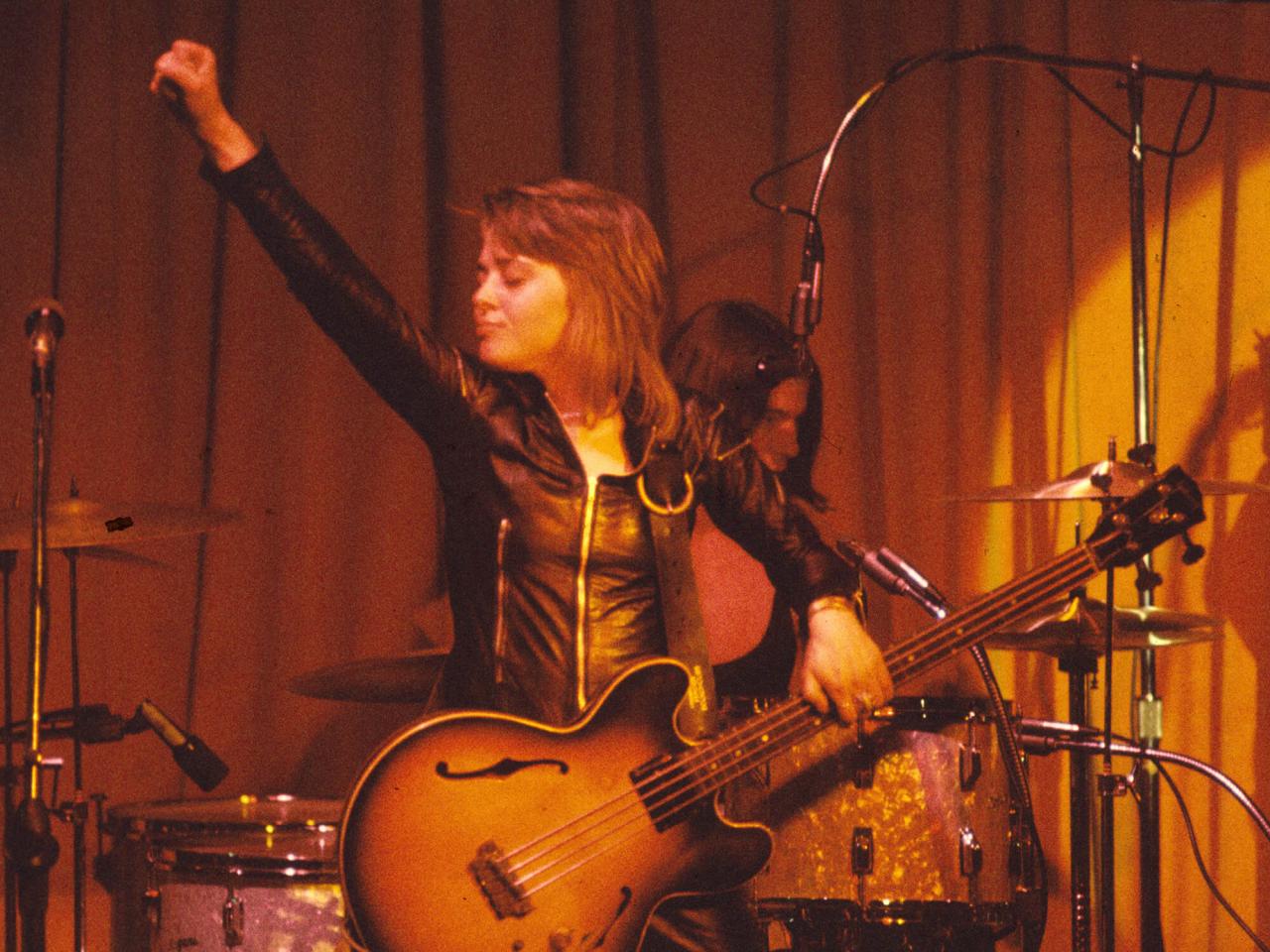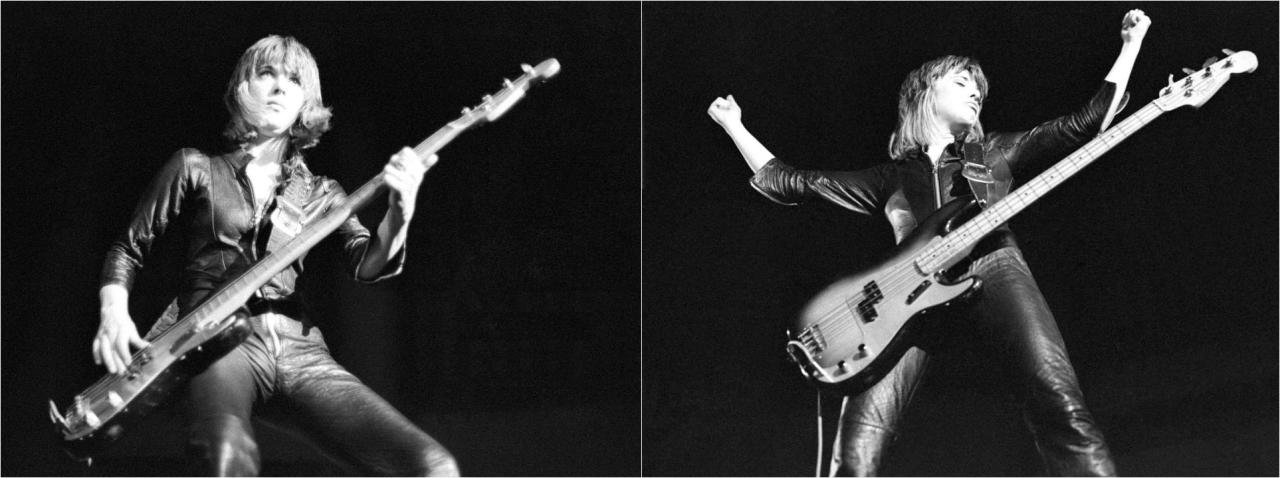Elvis Presley: Suzi Quatro recalls 1974 meeting snub – This story dives into a fascinating encounter between rock legends. Suzi Quatro, the pioneering female rocker, recounts a meeting with the King, Elvis Presley, in 1974, detailing an alleged snub that offers a glimpse into the complexities of fame and the sometimes-difficult personalities of iconic musicians. We’ll explore Quatro’s account, examining the context of the meeting and comparing it to other documented instances of Elvis’s behavior during that era.
We’ll also consider Quatro’s perspective as a female artist navigating the male-dominated rock scene of the 70s, and how that might have shaped her experience.
This exploration will delve into the details of the meeting itself, including the setting, other people present, and the specific actions or words that Quatro interpreted as a slight. We’ll then examine Elvis’s documented behavior during the 1970s, looking at his health, lifestyle, and personal struggles, to better understand the context of the alleged snub. Finally, we’ll consider alternative interpretations and explanations, acknowledging the subjectivity of personal experiences and the limitations of relying solely on one person’s recollection.
Suzi Quatro’s Account of the 1974 Meeting
Suzi Quatro, the pioneering female rock bassist, recounted a meeting with Elvis Presley in 1974 that left a lasting, negative impression. Her account details a brief encounter that she felt was marked by a distinct lack of warmth and acknowledgement from the King of Rock and Roll, an experience that contrasts sharply with the legendary charisma often associated with Elvis.The meeting took place backstage at a concert, although the precise location isn’t consistently detailed in all her tellings.
Other individuals were present, likely fellow musicians or members of Elvis’s entourage, creating a bustling and potentially overwhelming atmosphere. The overall mood, according to Quatro, was one of excited anticipation tinged with a nervous energy typical of backstage areas before a major performance. This context is crucial to understanding her perspective on the interaction.
Details of the Alleged Snub
Quatro describes approaching Elvis with a mixture of awe and nervous excitement. She expected at least a polite greeting from the iconic singer, given her own rising fame in the rock world. However, according to her account, Elvis barely acknowledged her presence. Instead of engaging in conversation or even a simple nod of recognition, she claims he seemingly ignored her completely, focusing his attention elsewhere.
This perceived disregard, she suggests, was the defining characteristic of their brief encounter, leaving her feeling deeply disappointed and somewhat humiliated. The lack of even a minimal acknowledgment from such a significant figure in her field is what she identifies as the “snub.” The specific words exchanged, if any, are not consistently reported in various accounts of the story, focusing instead on the perceived coldness of the non-verbal interaction.
Elvis Presley’s Behavior and Reputation in the 1970s
The 1970s marked a significant shift in Elvis Presley’s public image. While he remained incredibly popular, his behavior became increasingly erratic and fueled widespread speculation about his health and well-being. This period saw a decline in his performance quality for some, alongside increasingly bizarre and troubling reports about his personal life. Understanding this era requires examining both documented accounts and considering the context of his personal struggles.Elvis Presley’s behavior in the 1970s was often characterized by erratic mood swings, weight gain, and a dependence on prescription drugs.
Numerous accounts from those who worked with him, including his entourage and musicians, depict a man struggling with both physical and psychological challenges. These accounts range from stories of missed performances and unprofessional conduct to instances of impulsive behavior and paranoia. For example, he frequently demanded specific items, such as peanut butter and banana sandwiches, or a particular type of car, often leading to disruptions and delays.
His reliance on a large and ever-changing entourage further contributed to an atmosphere of excess and instability.
Elvis Presley’s Interactions with Others
Reports from various sources, including biographies and eyewitness accounts, paint a picture of inconsistent interactions with others. While some individuals described him as kind and generous, others recounted experiences of his volatile temper and unpredictable behavior. His relationships with his inner circle were often fraught with tension, and his demands could be unreasonable and even cruel. The increasing use of prescription drugs likely exacerbated these issues, leading to erratic behavior and strained relationships with family, friends, and colleagues.
This contrasts sharply with the earlier image of Elvis, highlighting the profound changes he underwent during this decade.
Comparison with Suzi Quatro’s Account
Suzi Quatro’s account of her 1974 meeting with Elvis reflects a pattern of behavior consistent with other documented instances of his interactions during the 1970s. Her description of a dismissive and seemingly uninterested Elvis aligns with reports of his increasingly erratic and detached demeanor. While Quatro’s experience is only one data point, it corroborates a broader picture of a man struggling with personal demons and removed from the engagement he once showed with his fans and colleagues.
The perceived snub, while potentially stemming from many factors including exhaustion and the pressures of his lifestyle, underscores the dramatic shift in his public persona.
Impact of Health, Lifestyle, and Personal Struggles
Elvis Presley’s health, lifestyle, and personal struggles significantly impacted his interactions with others. His dependence on prescription drugs, coupled with his demanding schedule and unhealthy diet, likely contributed to his erratic behavior and diminished capacity for social engagement. The physical toll of years of performing and the emotional strain of his personal life undoubtedly played a role in his transformation.
His increasing isolation and reliance on his inner circle further exacerbated these issues, creating a feedback loop of dependency and self-destructive behavior. These factors, taken together, offer a complex and multifaceted explanation for his actions during this tumultuous period.
Suzi Quatro’s Career and Perspective

Suzi Quatro’s career trajectory and perspective as a female rocker in the 1970s significantly shaped her experience and interpretation of her 1974 meeting with Elvis Presley. Understanding her accomplishments and the challenges she faced as a woman in a male-dominated industry provides crucial context for evaluating her account.Quatro’s perspective, forged in the crucible of a male-dominated rock scene, likely colored her interpretation of the encounter.
The 1970s presented unique challenges for female musicians, who often faced sexism, dismissal, and a lack of recognition compared to their male counterparts. Navigating this landscape instilled in Quatro a strong sense of self and resilience, potentially influencing how she perceived Elvis’s actions and the overall atmosphere of the meeting. Her experiences likely heightened her awareness of power dynamics and social expectations, impacting her recollection and assessment of the event.
Suzi Quatro’s Career Timeline
This timeline highlights key milestones in Quatro’s career before and around the 1974 meeting, illustrating her established status as a successful and independent female artist. This success contextualizes her perspective and suggests a level of expectation that may have been unmet during her encounter with Elvis.
- Early Career (1960s): Quatro began performing in bands in her native Detroit, honing her skills and developing her distinctive bass-playing style. This period laid the foundation for her future success.
- Move to England (1970): Relocating to England proved pivotal. The UK music scene offered a more receptive environment for her unique blend of rock and pop, paving the way for her breakthrough.
- Chart Success (early 1970s): Quatro achieved significant chart success in the UK and Europe with hits like “Can the Can” and “48 Crash.” This established her as a major force in the rock world and garnered her a dedicated fan base. This success makes her 1974 meeting with Elvis even more noteworthy, as she wasn’t just an aspiring artist but a well-established star in her own right.
- Television Success (1970s): Simultaneously, Quatro starred in her own television show, further solidifying her image as a strong and independent female rock star. This multifaceted career success further contextualizes her perspective and likely shaped her expectations during her meeting with Elvis.
- Continued Success (1974 and beyond): By 1974, Quatro had already achieved considerable international recognition and critical acclaim, making her a formidable figure in the music industry. Her success up to this point provides crucial context for understanding her account of the Elvis encounter.
Public Perception and Media Representation
The media’s portrayal of Elvis Presley, and its reaction to any perceived slight, like the alleged Suzi Quatro snub, significantly shaped public perception of the King. The initial response varied depending on the publication and its target audience, ranging from sensationalized gossip to more nuanced analyses of his behavior. This section will explore how media coverage of Elvis evolved throughout his career and how it influenced public opinion, particularly in light of incidents like the one described by Suzi Quatro.
Initial Media Reporting of the Alleged Snub
While the exact nature and extent of the media coverage immediately following the alleged 1974 incident between Elvis and Suzi Quatro is difficult to definitively trace without access to specific archives from that period, it’s likely that the story, had it been reported, would have appeared in music publications and gossip columns. Given the established reputations of both artists, any interaction, positive or negative, would have generated interest.
The tone likely depended on the publication’s stance – some might have focused on the perceived rudeness of Elvis, while others might have downplayed it or offered alternative explanations. The lack of widespread reporting, however, might suggest the event remained relatively private or was considered insignificant at the time.
Comparison of Media Portrayals of Elvis Presley Throughout His Career
Elvis Presley’s image in the media underwent a dramatic transformation throughout his career. Early portrayals focused on his charismatic stage presence, rebellious image, and groundbreaking musical style. Magazines and newspapers emphasized his youthful energy and the cultural impact of rock and roll. Photographs showcased his clean-cut appearance and captivating smile. As his career progressed and his lifestyle changed, media depictions shifted.
The later years often highlighted his weight gain, dependence on prescription drugs, and increasingly extravagant lifestyle. While some media outlets continued to celebrate his musical legacy, others focused on the more negative aspects of his personal life, contributing to a more complex and often less flattering image. The contrast between these portrayals illustrates how media narratives can significantly shape public perception of a celebrity.
Public Perception of Elvis: Before and After the Reported Incident
| Aspect | Before Reported Incident (Early to Mid-1970s) | After Reported Incident (Late 1970s and Beyond) |
|---|---|---|
| Image | The King of Rock and Roll; youthful, rebellious, charismatic, musical innovator. | A more complex image; still iconic, but also associated with substance abuse, weight gain, and a decline in performance quality. |
| Public Affection | Overwhelmingly positive; a cultural icon adored by millions. | A more nuanced view; while still admired for his music, concerns about his health and lifestyle emerged, leading to a decline in unqualified adoration. |
| Media Representation | Generally positive, emphasizing his talent and influence. | A mix of positive and negative coverage; some continued to celebrate his legacy, while others highlighted his struggles. |
| Overall Perception | Virtually untarnished; a symbol of American cultural revolution. | A more complicated legacy; still revered, but with a greater awareness of his personal struggles and vulnerabilities. |
Alternative Interpretations and Explanations: Elvis Presley: Suzi Quatro Recalls 1974 Meeting Snub

Suzi Quatro’s account of her 1974 meeting with Elvis Presley paints a picture of a dismissive encounter, a perceived snub. However, it’s crucial to consider alternative explanations for her interpretation, acknowledging the subjective nature of memory and the influence of various factors on how events are perceived and recalled. Multiple perspectives can lead to vastly different understandings of the same interaction.Different perspectives on the meeting significantly alter its interpretation.
Quatro, a rising female rock star, might have approached the interaction with a certain level of expectation, perhaps hoping for a more enthusiastic reception from the established King of Rock and Roll. Elvis, on the other hand, was reportedly struggling with prescription drug use and personal issues during this period, which might have affected his demeanor and social interactions.
His behavior might have been misinterpreted by Quatro as dismissive, when in reality it stemmed from personal struggles unrelated to her specifically. The cultural context of the 1970s also plays a role. Gender roles were more rigidly defined, and male dominance in the music industry was pervasive. A curt interaction from a male superstar to a female rising star might be viewed differently today, with a greater awareness of power imbalances and gender dynamics.
Elvis Presley’s State of Mind and Behavior
Elvis Presley’s well-documented struggles with prescription drug abuse in the 1970s significantly impacted his behavior and personality. His erratic and often unpredictable actions are well-documented in biographies and contemporary accounts. A simple lack of engagement or an unusually quiet demeanor during the meeting with Quatro could easily be attributed to the effects of medication rather than intentional rudeness or a deliberate snub.
His behavior might have been entirely out of character compared to his usual self, yet still completely explainable within the context of his well-documented health issues. For example, accounts from his close associates during this time frequently describe him as withdrawn and emotionally distant. This context alters the interpretation of a perceived “snub” into a possible symptom of his condition.
Communication Styles and Cultural Differences
Communication styles vary widely across individuals and generations. What one person perceives as a casual greeting, another might interpret as disinterest. In the 1970s, social interactions might have followed different conventions compared to today. Additionally, regional and cultural differences in communication styles could have played a role. A brief, seemingly unenthusiastic exchange might have been considered perfectly acceptable within a certain social context, yet viewed as rude or dismissive from a different perspective.
For instance, a more reserved or introverted individual might simply have a different communication style than a more extroverted and expressive person like Quatro. This difference could easily be misinterpreted as a negative interaction.
Personal Biases and Retrospective Memory
Memory is not a perfect recording device. Over time, memories can be altered, influenced by subsequent experiences and personal biases. Quatro’s recollection of the event, recounted years later, might be influenced by her own career trajectory and evolving perspective. The passage of time can reshape our understanding of past events, leading to interpretations that might not entirely reflect the reality of the initial interaction.
For example, the initial disappointment of not receiving a more enthusiastic response from Elvis could have been amplified over time, contributing to the narrative of a deliberate snub. The fact that Quatro’s career thrived independently of any endorsement from Elvis might even have inadvertently strengthened her retrospective perception of the encounter as being unimportant or dismissive.
Illustrative Scenario of the Meeting

The following narrative reconstructs Suzi Quatro’s 1974 meeting with Elvis Presley, drawing upon her recounted experiences and adding sensory details to create a vivid picture of the event. It’s important to remember this is an interpretation based on her recollections and may not be entirely precise.The air hung heavy with the scent of expensive cologne and stale cigarettes, a cloying mix that clung to the plush velvet curtains and the thick carpeting of the Graceland suite.
It was stiflingly hot, even for a Memphis summer, the kind of heat that made the skin prickle and the air itself seem thick and viscous. I remember the low hum of conversation, punctuated by the clinking of glasses and the occasional burst of laughter, all muffled slightly by the opulent surroundings.
The Setting and Atmosphere
The room itself was vast, a testament to Elvis’s wealth and extravagance. Gold leaf gleamed subtly in the recessed lighting, reflecting off the polished surfaces of furniture that seemed both antique and ostentatious. Several people milled about, a mix of Elvis’s entourage – managers, musicians, and hangers-on – their faces a blend of boredom and nervous anticipation.
The overall atmosphere was one of casual opulence, a strange juxtaposition of relaxed informality and underlying tension. There was a palpable sense of expectation, a feeling that something significant – or insignificant, as it turned out – was about to happen. Elvis himself was seated on a large, ornate sofa, his presence dominating the room despite his relatively relaxed posture.
He was surrounded by a small group of people, mostly men, engaged in hushed conversation. The air crackled with a strange energy; a blend of the electrifying aura of a superstar and the slightly unsettling feeling of being in the presence of someone accustomed to being deferred to without question. The background music was a low thrum of something vaguely bluesy, almost imperceptible yet omnipresent, like a heartbeat in the room.
Suzi Quatro’s Encounter with Elvis, Elvis Presley: Suzi Quatro recalls 1974 meeting snub
As I approached, a hush fell over the group. Elvis looked up, his eyes, magnified by his thick glasses, seemed to assess me with a detached curiosity. He offered a brief, almost perfunctory nod, a gesture that felt more like a royal acknowledgement than a genuine greeting. There was no warmth, no enthusiasm, just a cursory acknowledgment of my presence.
The conversation that followed was brief and stilted. I felt his indifference keenly, a palpable coldness that permeated the air between us. His responses were monosyllabic, his gaze distant, seemingly focused on something far beyond me, beyond the room, even beyond the walls of Graceland itself. The whole encounter felt strangely unreal, like a fleeting glimpse of a legend, a moment that was simultaneously momentous and utterly insignificant.
The memory of the encounter, despite its brevity, is still etched vividly in my mind, a poignant reminder of the complexities of fame and the sometimes surprising indifference of those who occupy its pinnacle. The experience, while disappointing at the time, served to solidify my own determination and drive. The brief, almost dismissive encounter only fueled my ambition to carve my own path to success, independent of the approval or recognition of others.
Summary

Suzi Quatro’s account of her 1974 meeting with Elvis Presley offers a compelling, if somewhat subjective, perspective on a pivotal moment in rock history. While the alleged snub remains open to interpretation, it serves as a reminder of the human side of even the most iconic figures. The story highlights the complexities of fame, the pressures of the music industry, and the enduring power of personal narratives in shaping our understanding of the past.
Ultimately, Quatro’s recollection invites us to consider the multifaceted nature of celebrity and the importance of empathy when evaluating historical accounts, particularly those involving sensitive personal interactions.
Query Resolution
Did Suzi Quatro ever publicly confront Elvis about the alleged snub?
There’s no public record of a direct confrontation. Quatro’s account emerged years later, likely as part of a broader reflection on her career.
What was Elvis’s overall health like in 1974?
By 1974, Elvis was struggling with prescription drug abuse, which significantly impacted his physical and mental health, potentially affecting his interactions with others.
How did the media react to Quatro’s account of the meeting?
The level of media attention varied. Some outlets covered it as a noteworthy anecdote, while others focused on other aspects of Quatro’s career or Elvis’s legacy.